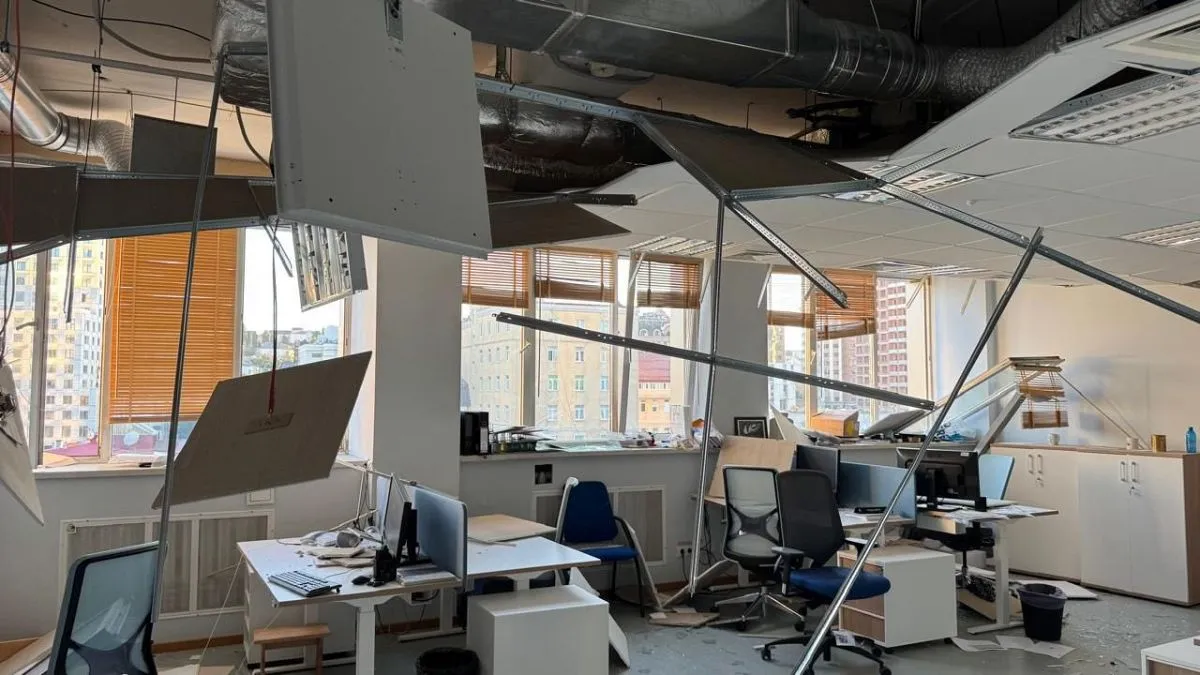
The recent missile and drone strike launched by Russia against Kyiv has inflicted severe damage on the European Union's delegation located in the Ukrainian capital. This alarming update was announced by the EU’s ambassador, Katarina Mathernova, on Thursday morning. The attack involved a staggering 629 missiles and drones as part of Moscow's ongoing campaign to instill terror and chaos, resulting in the tragic loss of at least 17 lives, including four children, while injuring dozens more and wreaking havoc across the city.
Mathernova described this act as Moscow's true response to ongoing peace efforts, underscoring the dire situation. Speaking from Brussels, Ursula von der Leyen, President of the European Commission, expressed her outrage regarding the assault and confirmed that no members of the EU delegation were harmed during the attack. She reported that two Russian missiles struck within 50 meters of the diplomatic building in just 20 seconds, highlighting the grave risk posed to diplomatic missions in conflict zones.
Von der Leyen's statement served as a sobering reminder of the stakes involved. She emphasized that the Kremlin's actions reveal a relentless pursuit of terror against Ukraine, indiscriminately targeting civilians—men, women, and children—and even threatening the European Union itself. This sentiment was echoed by António Costa, President of the European Council, who voiced his horror at the strike and reaffirmed solidarity with the Ukrainian people and EU staff. "The EU will not be intimidated," Costa declared, reinforcing the collective resolve to support Ukraine amid escalating Russian aggression.
Leaders from across the European Union, including France's Emmanuel Macron, Spain's Pedro Sánchez, Portugal's Luís Montenegro, and Lithuania's Gitanas Nausėda, joined in condemning the barrage of attacks. The Vienna Convention of 1961 provides protections for diplomatic and consular premises against damage, yet it is regrettably common for such buildings to be affected during wartime. Throughout its full-scale invasion of Ukraine, the Kremlin has consistently disregarded international rules and norms.
Kaja Kallas, the EU High Representative, described the strike as a deliberate choice to escalate violence and mock peace efforts, specifically referencing the mission led by former US President Donald Trump, which has garnered support from European allies. Current discussions are focused on crafting security guarantees for Ukraine and arranging a pivotal face-to-face meeting between Ukrainian President Volodymyr Zelenskyy and Russian President Vladimir Putin, a meeting which Putin appears to be avoiding.
In response to the attack, Zelenskyy urged the international community to intensify pressure on Russia to engage in meaningful negotiations. He lamented that Russia continues to evade the consequences of its actions, taking advantage of the fact that parts of the world remain indifferent to the plight of murdered children and continue to seek justifications for Putin's aggression. "It is definitely time for new, tough sanctions against Russia for everything it is doing," Zelenskyy asserted. He highlighted that all diplomatic deadlines have been surpassed, with numerous opportunities for dialogue squandered. "Russia must be held accountable for every strike and for every day of this war," he stated.
Von der Leyen committed to tightening sanctions against the Russian war machine with a new 19th package of EU sanctions set to be presented soon. In parallel, she revealed that the EU is exploring innovative ways to mobilize Russia's frozen assets—valued at approximately €210 billion on EU territory—to finance Ukraine's defense capabilities and reconstruction efforts. On Friday, she will commence an official visit to EU member states bordering Russia and Belarus, aiming to express the EU's unwavering solidarity and to share advancements in building a robust European defense industry.
This article has been updated with the latest developments and insights regarding this critical situation.